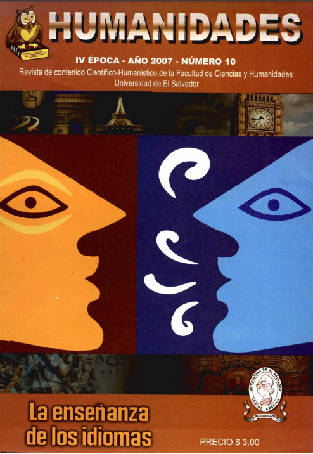El cronotopo de Xibalbá:
Tiempo y espacio desde el Popol Vuh hasta la pos-modernidad
Palabras clave:
Cronotopo, Popol VuhResumen
Entre las contribuciones mayas más importantes a la civilización mundial hay que destacar el concepto de xibalbá. Más que un lugar, o sea una especie de infierno maya, representa el cronotopo distópico o nomadológico por excelencia.
Descargas
Referencias
Alegría, Claribel & Darwin J. Flakoll. Ashes of 4alco (Cenizas de Izalco). Trans. Darwin J. Flakoll. Willimantic CT: Curbstone, 1989.
Asturias, Miguel Angel. El señor presidente. Buenos Aires: Lozada, 1956.
Arias, Arturo. Ideologías, literatura y sociedad durante la revolución guatemalteca 1944- 1954. La Habana: Casa de las Américas, 1979.
__Después de las bombas, 2a ed. Guatemala: Artemis, 1997.
Auerbach, Erich. Mimesis. Garden City NY: Anchor, 1957.
Bakhtin, Mikhail, "Epic and Novel," The Dialogic Imagination Ed. Michael Holquist, trans. Holquist and Caryl Emerson Austin: UTP, 1981, 3-40.
__"Form of Time and Chronoscope in the Novel" 84-258.
Barrera Vásquez, Alfredo y Silvia Rendón, eds. El libro de los libros de Chilam Balam. México: FCE, 1978.
Baudrillard, Jean. "The Evil Demon of Images and the Procession. of Simulacra." Docherty 1993: 197-205.
Beverley, John & Marc Zimerman. Literature and Politics in the Central American Revolutions. Austin: U Texas P, 1990.
Bourdieu, Pierre. Ce que veut dire parler: l'économie des échanges linguistiques. Paris: Fayard, 1982A.
____"The Practice of Reflexive Sociology: The Paris Workshop." 1982B: 217-260.
____& Loic J. D. Wacquant, ed. An Invitation to Reflexive Sociology. Chicago: U Chicago P, 1982B.
____"The Purpose of Reflexive Sociology: The Chicago Workshop." Pierre Bourdieu & Loic J. D. Wacquant 1982B: 61-216.
Bricker, Victoria. The Indian Christ, the Indian King. Austin: U Texas P, 1981.
de Certeau, Michel. Heterologies: Discourse on the Other. Minneapolis: U Minnesota P, 1989.
Deleuze, Gines & Félix Guattari. Gilles Deleuze & Félix Guattari. Anti-Oedipus., trans. Brian Massumi Minneapolis: U Minnesota P, 1983.
____A Thousand Plateaus, trans. Brian Massumi. Minneapolis: U Minnesota P, 1987.
____Nomadology: The War Machine. New York: Semiotext(e), 1986.
Docherty, Thomas, ed. Postmodernism. New York: Columbia, 1993.
Edmonson, Munro, trans. The Ancient History of the It.za: The Book of Chi/cm Balan: of Tkimin. Austin: U Texas P, 1982.
Foucault, Michel & Gérard Raulet, "Critical Theory/Intellectual history," (Interview). Trans. Jeremy Harding, ed. Lawrence Kritzman. Michel Foucault: Politics, Philosophy, Culture. NY: Routledge, 1988, 17-46.
Gossen, Gary H. Chamulas in the World of the Sun. Cambridge: U Harvard P, 1974.
Jameson, Fredric. "Postmodernism, or The Cultural Logic of Late Capitalism."Docherty 1993: 62-100.
Mattelart, Armand. Historia del la utopía planetaria. Barcelona: Paidós, 2000.
Quijano, Aníbal. "Modernity, Identity and Utopia in Latin America." Boundary 2 XX:3 (Fall 1993): 140-55.
Pasos, Joaquín. <> Steven F. White, ed. & trans. Poets of Nicaragua. Greensboro: Unicorn, 1982.
Readings, Bill. Introducing Lyotard. London: Routledge, 1991.
Said, Edward W. The World, the Text and the Critic. Cambridge: Harvard UP, 1983.
Tedlock, Dermis trans. Popol Vuh. New York: Touchstone, 1985.
Todorov, Tzvetan. Mikhail Bakhtin: The Dialogical Principle. Minneapolis: U Minnespota P, 1984.
____The Conquest of America, 2nd. ed. Norman: U Oklahoma P, 1992.
Vattimo, Gianni. "The Structure of Artistic Revolutions." Docherty 1993: 110-119.
Virilio, Paul. Speed and Poíitics, trans. Mark Polizzotti. New York: Semiotext(e), 1986.
Wacquant, Loic J. D. "Towards a Social Praexeology: The Structure and Logic of
Bourdieu's Sociology." Bourdieu & Wacquant 1982: 1--60.
Zavala, Magda & Seidy Araya. Literaturas indígenas de Centroamérica. San José: EUNA, 2002.
Descargas
Publicado
Número
Sección
Licencia
Derechos de autor 2021 Rick Mc Callister

Esta obra está bajo una licencia internacional Creative Commons Atribución-NoComercial 4.0.
Los autores continúan como propietarios de sus trabajos, cediendo de manera no exclusiva los derechos de difusión a la Revista Humanidades bajo los estándares de la Licencia Creative Commons Atribución No Comercial 4.0 Internacional (CC BY NC 4.0).






